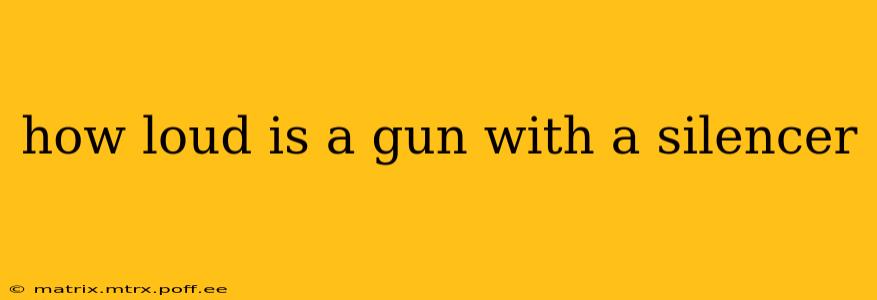The image of a silenced gun in movies and television is often dramatically quieter than reality. The term "silencer" itself is a misnomer; these devices, more accurately called suppressors, significantly reduce the sound of a gunshot, but they don't eliminate it entirely. Understanding just how much quieter a suppressed firearm is requires examining several factors.
What is a Gun Silencer/Suppressor?
A suppressor is a device attached to the barrel of a firearm that reduces the sound of the gunshot by slowing down and redirecting expanding gases. These gases are the primary source of the loud bang associated with gunfire. The suppressor doesn't work by "absorbing" the sound, but rather by controlling the release of energy. This process significantly lowers the decibel level, but it doesn't make the gun silent.
How Much Does a Silencer Reduce Gunshot Noise?
The noise reduction provided by a suppressor varies significantly depending on several key factors:
- Caliber of the firearm: Larger caliber rounds (e.g., .308 Winchester) produce more noise than smaller calibers (e.g., .22 LR). Suppression is generally more effective on smaller calibers.
- Type of suppressor: Different suppressors are designed for different calibers and have varying degrees of sound reduction. Some are more effective than others.
- Ammunition used: The type of ammunition (e.g., subsonic vs. supersonic) significantly impacts noise levels. Subsonic ammunition, traveling slower than the speed of sound, produces less noise than supersonic ammunition.
- Firing environment: The surrounding environment plays a role in the perceived loudness. A gunshot in a closed space will sound louder than in an open field.
Generally, a suppressed firearm will reduce the sound of a gunshot by 20-35 decibels. To put that into perspective: a typical gunshot without a suppressor can register around 150-170 decibels. A suppressed gunshot might fall in the range of 115-135 decibels. While this is a significant reduction, it's still extremely loud—comparable to a jet engine or a rock concert. Hearing protection is still absolutely crucial.
Is a Suppressed Gun "Quiet"?
No, a suppressed gun is not "quiet" in the way most people imagine. While significantly quieter than an unsuppressed firearm, the sound is still far above the threshold of what's considered safe for hearing without protection. It's more accurate to say that a suppressed gun is considerably less loud, but still dangerous to unprotected ears.
What is the Decibel Level of a Suppressed Gun?
As discussed above, the decibel level of a suppressed firearm is highly variable. However, a reasonable estimate would be anywhere from 115-135 decibels, depending on the factors outlined previously. This is significantly quieter than an unsuppressed firearm, but still very loud and potentially damaging to hearing.
Is it Legal to Own a Silencer/Suppressor?
The legality of owning a silencer/suppressor varies by country and region. In some jurisdictions, strict regulations and licensing requirements govern their possession. Always check with the relevant authorities in your area to understand the local laws and regulations before purchasing or possessing a suppressor.
Do Silencers/Suppressors Make Guns More Dangerous?
Suppressors do not inherently make firearms more dangerous. However, the reduced sound can mask the presence of a shooter, which might increase the risk in certain situations. The key here is that the dangerous element is the firearm itself, not the suppressor.
In conclusion, while suppressors significantly reduce the loudness of a firearm, they do not make it silent. They remain a loud, and potentially harmful, piece of equipment that requires responsible ownership and understanding. Hearing protection is crucial when using any firearm, whether suppressed or not.
